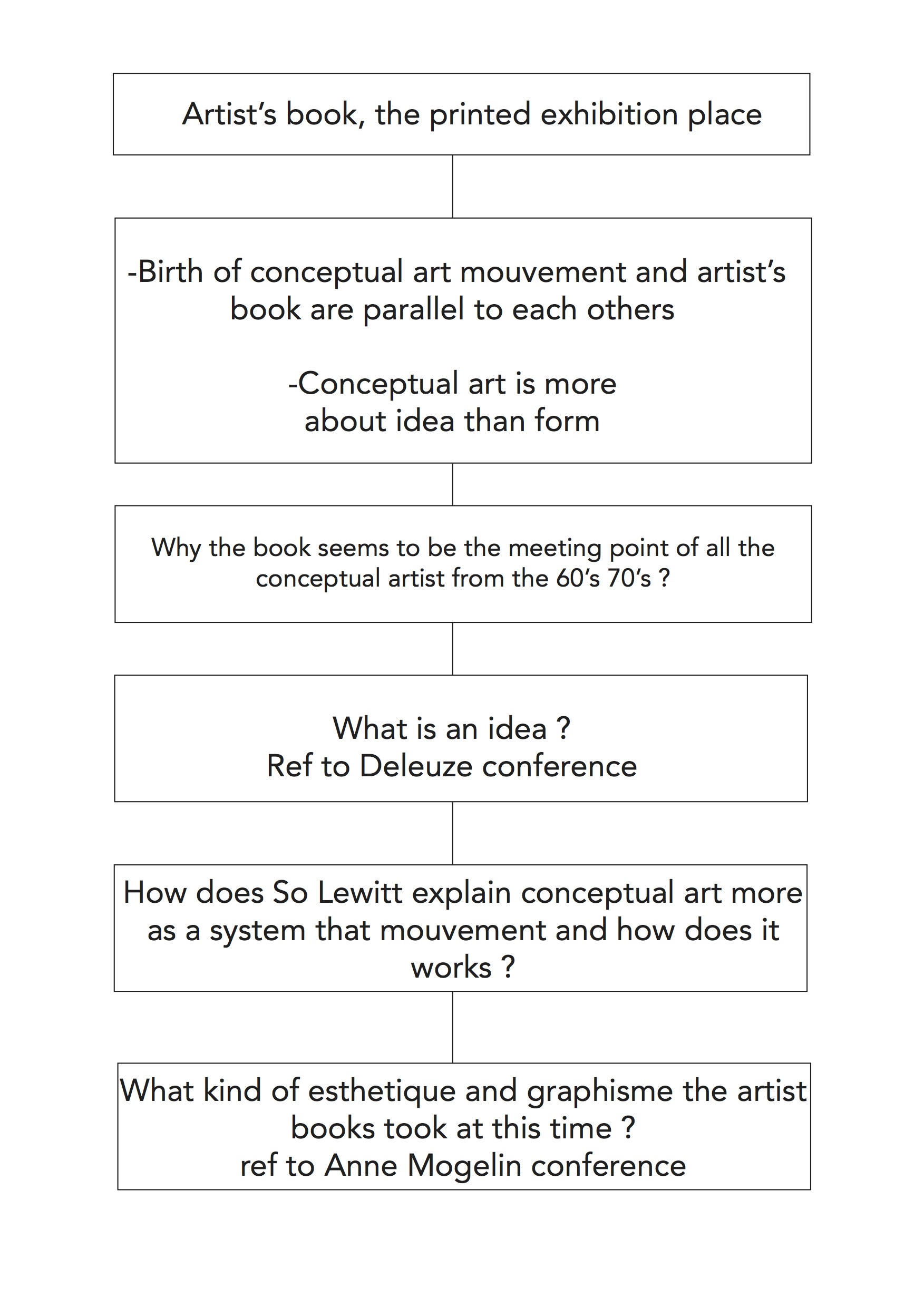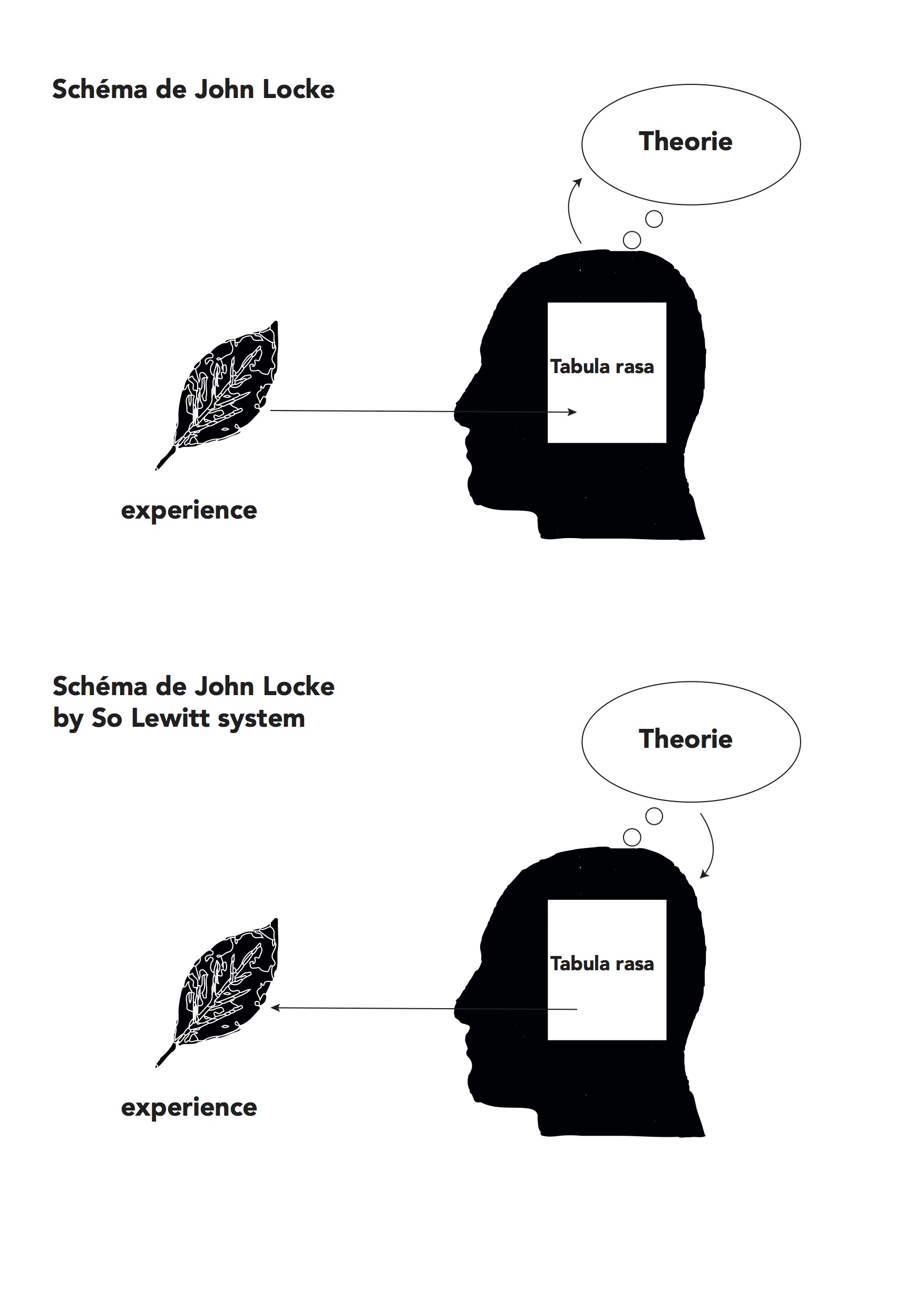User:NoemieVD/Final draft: Difference between revisions
No edit summary |
No edit summary |
||
| Line 60: | Line 60: | ||
'''Plan of the essay''' | '''Plan of the essay''' | ||
[[File:plan essay - copie.jpg]] | [[File:plan essay - copie.jpg]] | ||
Different ways of using a system, between John Locke and So Lewitt | |||
'''Different ways of using a system, between John Locke and So Lewitt''' | |||
[[File:scheama john locke - copie.jpg]] | [[File:scheama john locke - copie.jpg]] | ||
How to create conceptual art tutorial based on So Lewitt text | |||
'''How to create conceptual art tutorial based on So Lewitt text''' | |||
[[File:tuto So leWitt.jpg]] | [[File:tuto So leWitt.jpg]] | ||
Revision as of 20:13, 29 November 2016
Conceptual art, a philosophy or a system ?
In this essay, I will begin to explore the relationship between conceptual art and artist books. Conceptual art begins in New York , USA, at the beginning of the 60’s to the 70’s. Artist as Joseph Kosuth, So Lewitt, Richard Barry and much more were part of this « movement. » When I started to die in their works I understood that at the time the form of the artist’s book was created. Conceptual art is never define as a movement, which is why I put the world between commas at first, it most look like as a system than an art period. Because it doesn’t requires any particular skills from the artist or the use of specific materials as painting for example, we cannot assume at first side that conceptual art has his typologies. Regarding this statement, of no forms needed, I will ask this question, if there were no forms of art define why all conceptual artist of this time find their way to express themselves in books ? Also I will also ask the question to open this research to a potential project, can we really remove chance from art work ? The main guides lines that I think is good to remember while we will begin our journey in conceptual art is that all that matters is the idea.
The idea is what makes art. But even if we agree already on this, what is exactly an idea ? We will first try to find out, with the help of Deleuze and hi s words in his conference, What is the act of creation in the cinema, Femis,Paris 1987.
After that we will look at how conceptual art is working and what could be a workflow of a conceptual artist as So Lewitt, in regards to his text « Paragraph on conceptual art, p.834, Institution and objection »
To conclude, I will explain a project those researches makes me think about and how I could achieve it.
I chose to speak about this conference (http://contemporaneitesdelart.fr/quelle-place-pour-lart-en-ce-xxieme-siecle/gilles-deleuze-quest-ce-que-lacte-de-creation/) because, in many ways Deleuze and his philosophy is exploring diverse topics I have been asking myself about, and about artist books. In this conference Deleuze begin by asking this question, what is to have an idea in cinema ? Even if the topic seems far from what is a book, it is not completely true. If we consider that the act of publishing is to make things public, then cinema is an act of publishing. For Deleuze to have an idea is rare. And when you construct one it’s a party. The idea can not be created if it’s not related to our own fields of expertise. From the moment the idea has been created it’s part of the world and it cannot be taken back. But the most important thing is to created the idea needs to be needed. The artist, or the philosopher, when they are creating an idea, they are actually saying « I have something to tell to someone ». On this point I feel I have to do a little digression. The famous sentence of conceptual artist is actually « I am thinking about what I am thinking », and I thought that the contrast between those two sentences created a contrast that will be maybe interesting to dig in later on. What is really interesting regarding the conceptual art and the concept of what is an idea, is that ideas and concept of all diverse discipline meet on one point. The limit of time and space. An idea cannot be created without time and space. There are its parents but also its limits. Deleuze is also saying that artist as Bresson, he was use to take his photographs has a serial of moment. « They weren’t pre-determined », like if they weren’t not thought before doing it. Which, we will see that later with the So Lewitt system about conceptual art that, according to him a conceptual artwork, the idea and its application needs to be think and prepare before anything begins. But besides that, it’s not rare to see in artist books, different documents, as photographs, archives, notes, drawing put together within the same book. We could ask this question are all the artist books are determined to be a set or are they a collection of un-determined moment ? Much later Deleuze, talk about the relationship between the act of creation and the act of resistance. This come back to the topic to space and time. Malraux said « Arts is the only thing that resists to death ». Books as movies has their own time, but I will allow myself to agree with Malraux. Books and artist's book are the only object that last after the artist. Could we say that artist’s book are a form of resistance? This conference may seems a bit far from our main topic, but actually I thought it was a really good way to start. Because art, or books, or movie are some ways to make things public, they shared the same limits of time and space ( even if in books space mean paper) and also because they share the act of resistance, they all survive to time ( even if each time is different from one and other).
For the next part, I will explain with the help of the text of So Lewitt what is for him conceptual art and how exactly does it appears to works. « Paragraph on Conceptual Art, of So Lewitt », this text has been published in Artforum vol 5 n°10 in 1967. So Lewitt is at this time a conceptual artist. In this text he try to explain what and how works conceptual art.
Because he is conceptual artist he experience the process and describe it in this text conceptual art as a system. How this system of ideas is working ? What kind of workflows do conceptual art is actually using to create ?Because this movement seems to me a really complex one, it doesn’t have his own materials, techniques but plural mediums. But it sure has an esthetic. Because different artist that are defining themselves as conceptual artist all have their own definition of it it’s really complicate to make a statement that regroups all of them. That is for, in this text I found really interesting that So Lewitt explain it has a system, that apparently works because he use it himself in his art. In this text the artist is not giving his own point of view, instead he is really describing his process of creation and moreover the art conceptual process.
The author is describing conceptual art system and its guide lines which seems to be really open. Open in a sens that there is not a final form, no materials as paintings or sculpture or photographs. The only thing that matters for So Lewitt to create conceptual art is the idea, the good idea. We can imagine how diverse it application can be. The main idea of the text beside explaining and analyses what is conceptual art is also to transmit the feeling that conceptual art is all about questioning ourselves. What is the form we can give to it ? Do we need to give her a form ? Does she has a place out there ? From this text and the questions that are present in there, I will take those to begin to analyze artist books. What could have been the idea of the artist? Why did he did his books ? Why this form?
But just after thinking about all those things I realize that if I keep want to put conceptual art in a box, giving to it a really, stable definition I will just go against one of there most claiming idea, that conceptual art is everything and nothing and they are without any typology. « Conceptual art is only good when the idea is good » Sol Elwitt.
In this essay I tried to explain or to show that conceptual art is more about idea than particular type of art. While I was interesting myself to all that I was thinking about a project. Imagine yourself in a room , there is a computer, a printer and a 3D printer. The participant of this experimentation will have to put 3 worlds in the computer, one could be name, an adjective or an object. After that, I would like to create a software that will go looking all the links that it could find between those three different things, each time the computer find something relevant enough, as sentence, images, documents it save it. When 5 mn passed, the software stop and it generating a pdf with all those information, in a graphic greed and print it. The 3D printer will be the final step that what look like all the data you ask the computer to look for you. At this end of the experiment you could have your own edition about the three worlds you gave to the computer, and a 3D sculpture that is an illustration of all the data you extract from internet. To relate to the previous statement about the two texts, conference above, is that the main idea of this project is settle but the final form is never sure because you can never know what the result will be. Conceptual artist may always want to control the form before doing it, but can we really related to that I each act of creation ? Because if we do, it means we are taking of a main part of creativity, the chance.
Bibliography :
Deleuze, what is the art of creation, Femis, Paris, 1987 ( http://contemporaneitesdelart.fr/quelle-place-pour-lart-en-ce-xxieme-siecle/gilles-deleuze-quest-ce-que-lacte-de-creation/).
So Lewitt, Artforum vol 5 n°10 in 1967.
Peter Goldie and Elisabeth Schellekens, How is afraid of conceptual art 2010.
Graphics
Here are some graphics that explains how I interepretd the texts I read and how I wanted to make my essay
Plan of the essay
Different ways of using a system, between John Locke and So Lewitt
How to create conceptual art tutorial based on So Lewitt text



